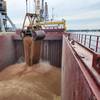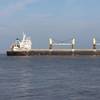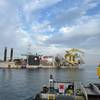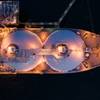APL Landmark $11M Clean Air Plan in Oakland
Global shipping leader APL and the Bay Area Air Quality Management District announced a landmark $11m project to cut vessel emissions and improve this city's air quality starting in 2010.
Armed with $4.8m in air quality grants, the world's fifth-largest container carrier said it will retrofit its terminal and vessels to begin cold-ironing next December at the Port of Oakland. Cold-ironing is industry jargon for turning off a ship's 2,000 horsepower diesel generators at berth and connecting instead to electrical sources ashore. This enables vessels to maintain power in port while eliminating exhaust emissions.
Cold-ironing will cut more than 50,000 pounds of nitrogen oxide emissions - a leading component of smog -- from ships berthed in Oakland and 1,500 pounds of particulate matter annually. APL will be the first and only carrier or terminal operator at the port to cold-iron vessels.
"Our job is to move the world's trade," said APL Americas Region President John Bowe in making the announcement. "Thanks to our partnership with the Air Quality District, we're proving that we can do it in a way that's sensitive to our neighbors in the community."
Starting this month, APL will begin outfitting five vessels that call regularly in Oakland for cold-ironing. Late next summer, APL will launch a four-month construction project to electrify berths at its Global Gateway Central marine terminal in Oakland. When that work is completed, cold-ironing will begin.
Cold-ironing is considered one of the most effective ways to curb emissions from vessels at port and improve coastal air quality. Regulations mandating cold-ironing in California take effect in 2014. But APL is beginning three years sooner.
"Diesel emissions from port operations have a serious health impact in the West Oakland community," said Jack Broadbent, Executive Officer of the Bay Area Air Quality Management District. "APL is getting a head start to reduce emissions well before the state deadline."
The Air District will fund two grants being provided to APL. They include:
• $2.8m to electrify berths at Global Gateway Central. The funds are from the Goods Movement Bond Program.
• $2m to equip the first three container ships for cold-ironing
The funds are from the Carl Moyer Memorial Air Quality Standards Attainment Program. It's estimated that cold-ironing can eliminate 1,000 pounds of nitrogen oxides emissions, 165 pounds of sulfur oxides and 30 pounds of particulate matter in a single 24 hour port call. The vessels APL will retrofit make a total of 52 calls to Oakland annually.
APL employs up to 250 people a day at its Oakland marine terminal. That number could increase in 2010 if economic recovery spurs a jump in trade growth. Cold-ironing is seen as an effective way to curb the environmental effects of growth.
(www.apl.com)











